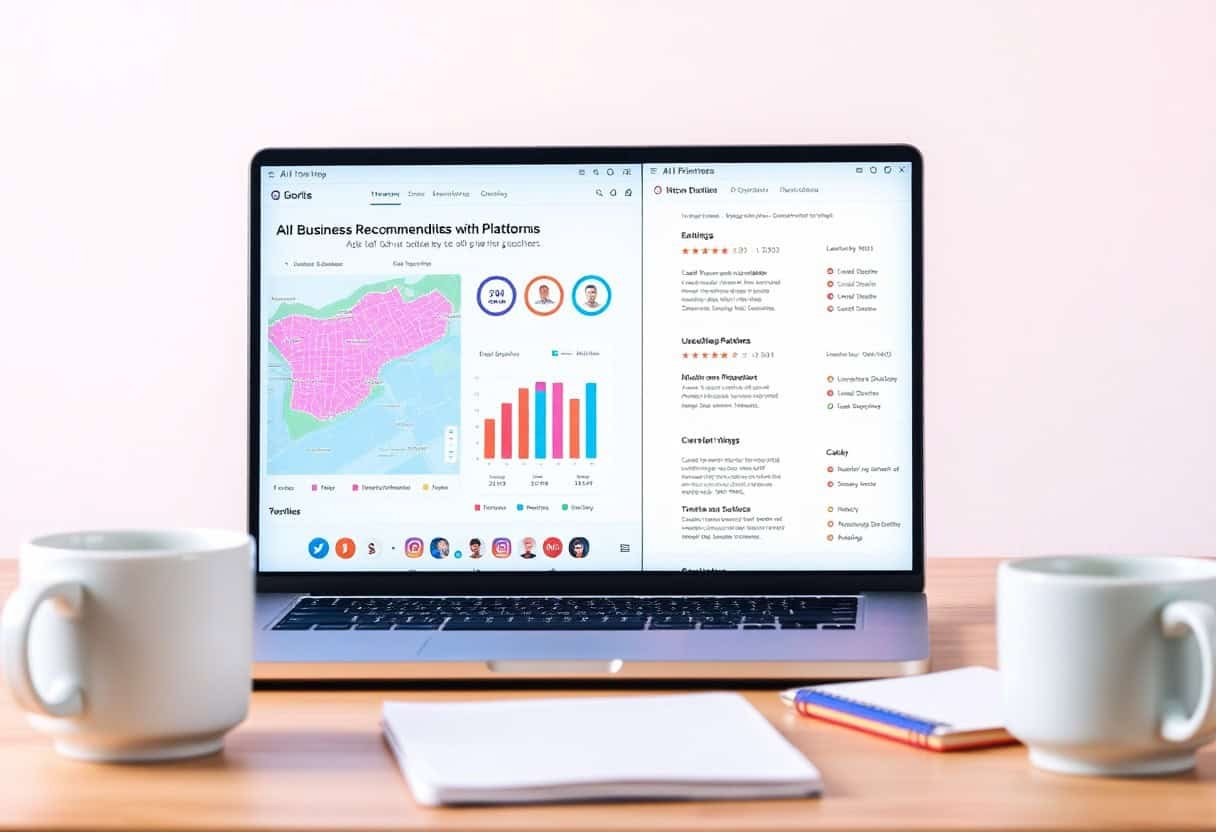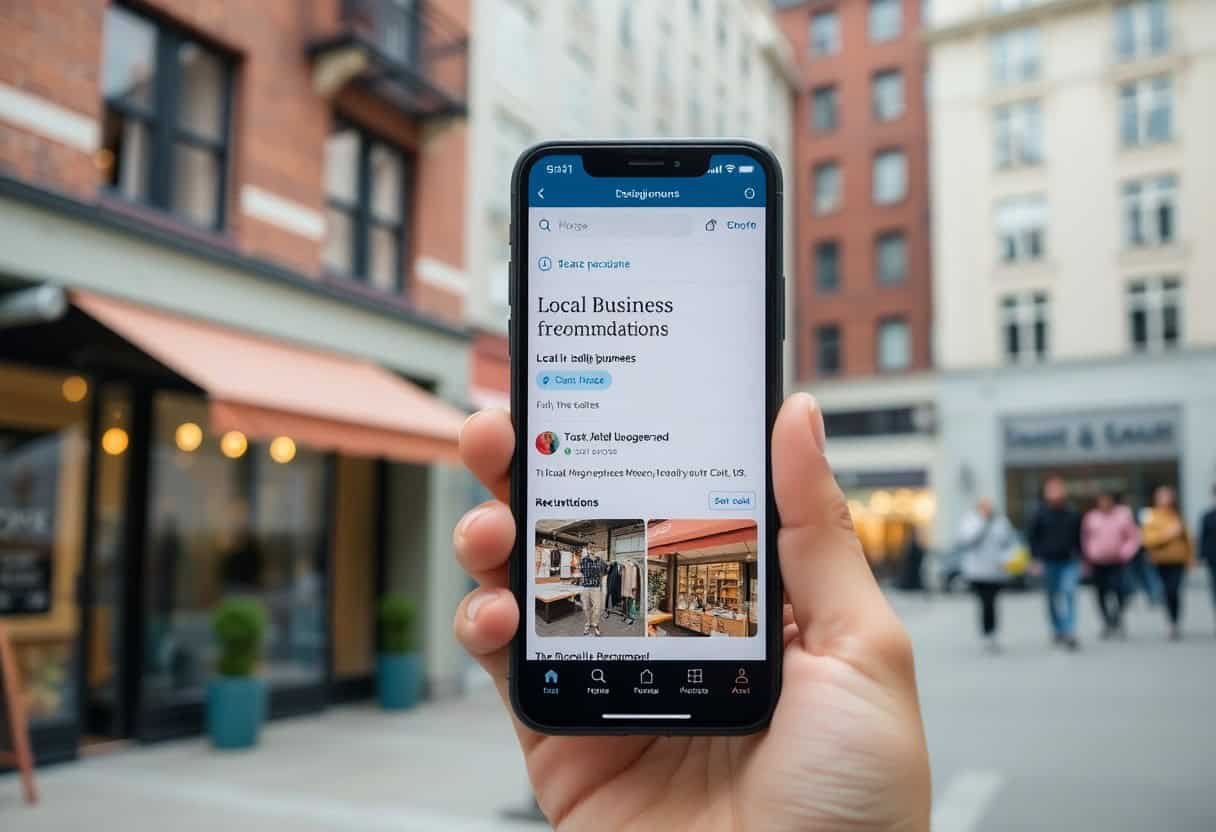There’s a growing reliance on AI platforms to discover local businesses that meet your needs. With the rise of personalized recommendations, these platforms leverage user data and advanced algorithms to connect you with shops, restaurants, and services nearby. In this post, you’ll explore various AI-driven tools that offer tailored local business suggestions, helping you make informed choices that suit your preferences and lifestyle.

Key Takeaways:
- Google My Business provides local business recommendations based on user location and search history.
- Facebook’s local search features connect users with nearby businesses through recommendations by friends and community feedback.
- Yelp leverages user reviews and ratings to suggest local businesses that align with user preferences.
Mapping the Terrain: Key AI Platforms for Local Business Recommendations
Several AI platforms excel in providing tailored local business recommendations, enhancing your ability to connect with potential customers. Integrating location data, user reviews, and machine learning algorithms, these platforms offer insights that help you make informed decisions. As you explore these services, you’ll discover how they leverage innovative technology to drive local engagement and boost your visibility in a competitive landscape.
Google My Business: The Power of Local Search Integration
Google My Business stands out as a powerful tool for local search integration, allowing you to manage your business’s online presence across Google services. By optimizing your listing, you enhance visibility when customers search for nearby services. Features such as reviews, photos, and business information improve user engagement, making it easier for local consumers to find and choose your business.
Yelp’s AI-Driven Insights: User-Generated Content Meets Machine Learning
Yelp harnesses user-generated content, combining it with machine learning to deliver personalized local business recommendations. By analyzing user behavior and preferences, its algorithms can highlight businesses that align closely with your interests. This ensures that the recommendations you receive reflect genuine local insights and experiences.
The strength of Yelp’s AI-driven insights lies in its extensive database of reviews and ratings contributed by local users. This creates a wealth of data for machine learning models to draw from, enabling more accurate and personalized recommendations. The system identifies patterns in user preferences, allowing you to discover hidden gems in your area based on reliable community feedback. By engaging with the platform, you can also contribute to the ecosystem and influence recommendations for others, enhancing the overall user experience.
Facebook and Instagram: Social Algorithms Crafting Local Discoveries
Facebook and Instagram utilize sophisticated social algorithms to craft localized recommendations, guiding users toward nearby businesses that match their interests. The platforms analyze your interactions, such as likes and shares, to tailor content and suggestions. This personalization fosters deeper connections with local offerings, bridging the gap between social discovery and commerce.
These platforms leverage extensive user data not only to enhance content relevance but also to create a community around local businesses. When you engage with nearby shops or services through likes, comments, or shares, algorithms take note, making it more likely for similar businesses to appear in your feed. This community-driven approach empowers you to easily find and support local enterprises while staying informed and connected with the marketplace in your area.

Comparative Analysis: Strengths and Weaknesses of Popular Platforms
| Platform | Strengths and Weaknesses |
|---|---|
| Google My Business | Widespread visibility; comprehensive features. Limited personalized recommendations. |
| Yelp | Strong user-generated content; detailed filtering options. May have biased reviews. |
| Extensive social integration; good for local engagement. Algorithm can bury lesser-known businesses. | |
| Nextdoor | Highly localized recommendations; community-focused. User base can be limited outside urban areas. |
User Experience: Navigating Recommendations with Ease
You seek platforms that make finding local recommendations straightforward and enjoyable. Google My Business excels with simple navigation and clear listings, while Yelp offers intuitive filtering options to tailor search results. Facebook integrates recommendations within social feeds, albeit sometimes overwhelming with information. Nextdoor’s localized format fosters community interaction but might feel restricted in options compared to broader platforms. You benefit from a seamless user experience that enhances your ability to discover nearby businesses effortlessly.
Data Reporting and Transparency: Trust in Algorithmic Choices
Trust in AI recommendations hinges on the transparency of data reporting. Platforms like Google My Business provide performance metrics, showing how your listings fare against local competitors. Yelp promotes transparency with user-generated reviews and insights into how recommendations are generated. Facebook’s policies outline data usage, yet often cloud algorithm specifics. Nextdoor encourages user participation, creating a transparent community feel, although data metrics may remain unclear. Understanding each platform’s approach allows you to choose one that aligns with your trust in data accuracy and integrity.
Transparency in algorithms ensures that you can confidently rely on the recommendations provided by these platforms. Google My Business regularly updates its guidelines, giving users insight into ranking factors that affect visibility. Yelp’s emphasis on user-generated content, alongside the visibility of review scores, creates a more trustworthy atmosphere for decision-making. Facebook’s lack of clarity can lead to skepticism, while Nextdoor’s community focus fosters engagement, though the data reporting remains somewhat vague. Evaluating how each platform communicates its methodologies helps you determine which one resonates most with your values on data integrity.
The Role of Machine Learning: How AI Understands Local Preferences
Machine learning algorithms analyze vast datasets to uncover patterns that reflect local consumer behaviors, enabling a better understanding of preferences across different demographics. By evaluating variables such as location, search history, and user interactions, machine learning fine-tunes recommendations to align with what local audiences are actively seeking. As these systems continuously learn from new data, they adapt to shifts in trends and tastes, creating a dynamic interaction with users.
Natural Language Processing in Customer Reviews and Feedback
NLP techniques play a vital role in interpreting customer reviews and feedback, allowing AI to gauge sentiment and derive insights from unstructured text data. By converting qualitative feedback into quantifiable metrics, this technology helps identify common themes and specific areas where a business excels or falls short. For you, this means improved recommendations that more accurately reflect real experiences and expectations from local establishments.
Predictive Analytics and Personalization: Catering to Individual Needs
Predictive analytics leverages historical data to forecast future preferences, enabling businesses to tailor recommendations specific to each user. By analyzing your past behaviors, such as previous purchases or interactions, AI can suggest local businesses that you are more likely to enjoy, enhancing your overall experience. This personalized approach not only increases user satisfaction but also encourages higher engagement and loyalty.
Predictive analytics empowers platforms to create highly customized experiences based on user behavior patterns. For instance, if you frequently dine at Italian restaurants, AI algorithms recognize this preference and prioritize similar local options in future recommendations. By combining data points such as time of day, location, and past ratings, the engine can further refine suggestions, ensuring you discover hidden gems aligned with your tastes. This level of personalization transforms the way you explore local businesses, making your choices both relevant and delightful.
Local Business Success Stories: Transformative Effects of AI Recommendations
AI-driven recommendations have empowered local businesses to thrive by enhancing customer engagement and driving sales. For example, a small boutique that utilized AI analytics experienced a 30% increase in foot traffic after implementing personalized recommendations based on customer preferences. Such success stories illustrate how leveraging AI can transform insights into action, leading to improved business outcomes and increased customer loyalty.
Community Impact: Businesses Thriving through Targeted Recommendations
Targeted AI recommendations have significantly bolstered community businesses, fostering local economic growth. When a local restaurant adopted AI tools for personalized marketing, it saw a 40% rise in new customers within three months. These platforms not only help businesses connect with the right audience but also create a ripple effect, benefiting the entire local economy through increased sales and job opportunities.
Lessons Learned: Adaptability and Agility in a Tech-Savvy Landscape
Success in today’s market hinges on adaptability and agility, particularly for local businesses navigating technology. Firms that embraced AI solutions early often outpace competitors by swiftly responding to consumer feedback and market trends. For instance, a local gym that adjusted its offerings based on AI insights about member preferences not only retained its clientele but also attracted new members, highlighting the importance of embracing change.
Incorporating adaptability means being open to continuous learning and improvement. Many local businesses have found that analyzing real-time data helps refine their strategies consistently. Utilizing platforms that offer dynamic insights allows businesses to pivot when new opportunities or challenges arise. A café that adjusted its menu offerings based on AI-driven suggestions improved sales by 25%, affirming that staying agile in a technology-focused environment is necessary for long-term viability and growth.
Summing up
Considering all points, you will find that several AI platforms excel in providing local business recommendations tailored to your preferences. Platforms like Google Assistant, Yelp, and Facebook utilize advanced algorithms to analyze your location and interests, ensuring that the suggestions are relevant and personalized. By leveraging these tools, you can easily discover businesses that suit your needs, enhancing your experience within your community.
FAQ
Q: Which AI platforms provide local business recommendations for users?
A: Several AI platforms specialize in local business recommendations, including Google My Business, Yelp, and Facebook. These platforms utilize algorithms that take user preferences, location data, and previous interactions into account to suggest relevant local businesses.
Q: How do these AI platforms gather data for local business recommendations?
A: AI platforms gather data through various means, including user reviews, ratings, business listings, and location data. They analyze user behavior and preferences to create personalized recommendations, ensuring that the suggestions are relevant to the user’s location and interests.
Q: Can users influence local business recommendations on these platforms?
A: Yes, users can influence recommendations by leaving reviews, rating businesses, and interacting with the platform. Providing feedback and updating preferences helps the AI algorithms refine future suggestions, making them more tailored to the user’s tastes and needs.

